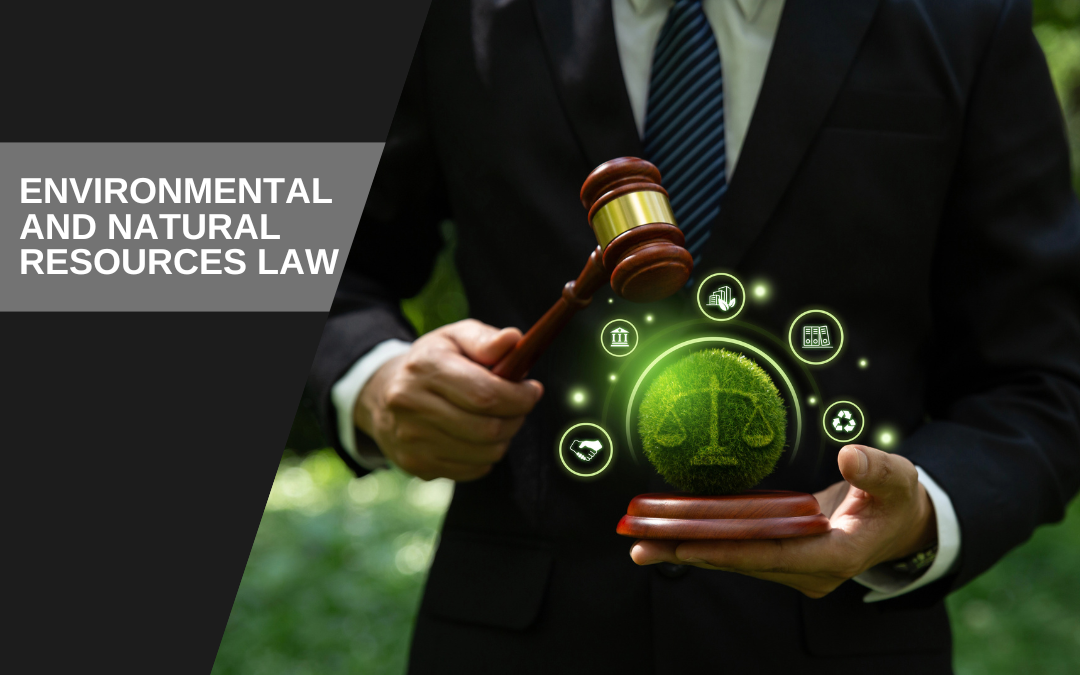
Frequently Asked Questions (FAQs) About Environmental and Natural Resources Law
What Is Environmental and Natural Resources Law?
Environmental and Natural Resources Law governs how individuals, businesses, and governments interact with the environment. This area of law covers issues like air and water pollution, hazardous waste, land use, wildlife protection, and the management of natural resources such as oil, gas, forests, and minerals. It includes both federal and state regulations designed to protect public health and natural ecosystems. Key federal statutes include the Clean Air Act, Clean Water Act, Endangered Species Act, and the National Environmental Policy Act (NEPA). Lawyers in this field help clients understand and comply with regulations, obtain necessary permits, respond to agency enforcement actions, and resolve disputes related to environmental harm.
What Agencies Regulate Environmental Laws in the U.S.?
Environmental laws in the U.S. are regulated by several federal and state agencies. The primary federal agency is the Environmental Protection Agency (EPA), which enforces laws related to air, water, and hazardous waste. Other key agencies include the Department of the Interior, U.S. Fish and Wildlife Service, Bureau of Land Management (BLM), and Army Corps of Engineers. At the state level, each state typically has its own environmental department or agency that administers local laws and may implement federal standards. Legal compliance often involves navigating overlapping jurisdictions and cooperating with multiple agencies.
What Is the National Environmental Policy Act (NEPA)?
The National Environmental Policy Act (NEPA) is a foundational environmental law passed in 1969. It requires federal agencies to assess the environmental impact of their actions before making decisions. This process often involves preparing an Environmental Assessment (EA) or a more detailed Environmental Impact Statement (EIS) for projects such as highways, airports, or energy development. NEPA ensures transparency, public involvement, and consideration of environmental consequences. While NEPA doesn’t mandate a specific outcome, it plays a critical role in holding agencies accountable for environmentally responsible decision-making.
Do I Need a Permit for Land Development Near Waterways?
Yes, if you plan to develop land near rivers, wetlands, or coastal areas, you likely need permits. Under the Clean Water Act, activities that may discharge pollutants or fill material into navigable waters or wetlands require a Section 404 permit from the U.S. Army Corps of Engineers and possibly a state permit. Failing to obtain proper authorization can result in enforcement actions or costly delays. An environmental attorney can help determine which permits apply, guide you through the process, and ensure compliance with both federal and state regulations.
What Are the Consequences of Violating Environmental Laws?
Violations of environmental laws can result in serious penalties, including hefty fines, cleanup orders, permit revocation, or even criminal charges. The Environmental Protection Agency (EPA) and state agencies have authority to enforce environmental regulations. Companies may be held liable for pollution, improper waste disposal, or unauthorized land use. Penalties depend on the nature and severity of the violation. In some cases, violators must also pay for remediation or compensate affected communities. Consulting with an attorney early can help resolve disputes or negotiate a favorable outcome.
What Is the Difference Between Renewable and Non-Renewable Resources in Law?
In legal terms, renewable resources are naturally replenished on a human timescale—like solar energy, wind, timber, and water. Non-renewable resources include fossil fuels, minerals, and other finite materials. U.S. laws and policies often encourage sustainable use of renewable resources through permits and conservation programs. Non-renewable resources, on the other hand, are heavily regulated to ensure responsible extraction, fair use, and environmental protection. Legal issues may involve resource rights, royalties, leasing agreements, and compliance with environmental standards during extraction or use.
Can Private Landowners Be Held Liable for Environmental Damage?
Yes, private landowners can be held liable for environmental contamination or damage caused by activities on their property. Under the Comprehensive Environmental Response, Compensation, and Liability Act (CERCLA)—also known as Superfund—property owners may be responsible for cleaning up hazardous substances, even if they did not cause the contamination. Landowners may also face liability for violating state regulations, damaging wetlands, or disrupting wildlife habitats. Conducting environmental due diligence before purchasing or developing land can help minimize legal risks.
How Does the Endangered Species Act Affect Land Use?
The Endangered Species Act (ESA) protects threatened and endangered plants and animals and their habitats. If your project may impact a listed species or critical habitat, you must consult with the U.S. Fish and Wildlife Service or NOAA Fisheries before proceeding. This may involve habitat assessments, conservation measures, or modifications to the project. Violating the ESA can result in fines or project delays. Legal guidance ensures you comply with ESA requirements and avoid unintentional harm to protected species.
What Is an Environmental Impact Statement (EIS)?
An Environmental Impact Statement (EIS) is a comprehensive analysis required under NEPA for projects that may significantly affect the environment. It examines potential impacts on air, water, land, wildlife, and human communities. The EIS process includes public input, alternative proposals, and mitigation strategies. It applies to major federal projects like highways, pipelines, and energy facilities. The EIS helps decision-makers understand environmental consequences before moving forward. Failing to complete an adequate EIS can result in legal challenges and project delays.
When Should I Hire an Environmental Lawyer?
You should consider hiring an environmental lawyer if you’re:
- Developing or buying property with environmental concerns
- Dealing with government investigations or permit issues
- Facing enforcement actions or lawsuits
- Navigating complex regulatory compliance
- Involved in oil, gas, or mineral resource development
Environmental law is complex and ever-evolving. A knowledgeable attorney can help you avoid liability, resolve disputes efficiently, and advocate for your rights. Whether you’re a business, landowner, or nonprofit, early legal guidance is key to protecting your interests and ensuring compliance.
These FAQs are for general informational purposes only and are not legal advice. Contact us today to discuss your specific situation.
